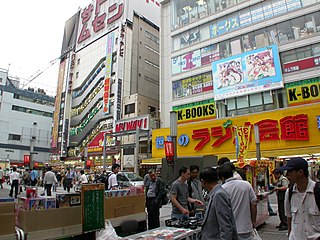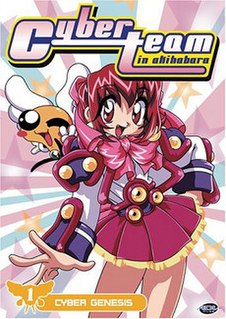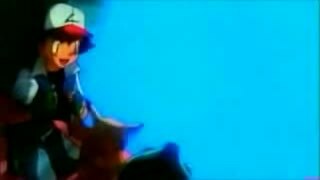See also
- Deno (disambiguation)
- Cyberteam in Akihabara, a Japanese science fiction anime series also known as Akihabara Dennō Gumi
- Dennos Museum Center, a fine art museum in Traverse City, Michigan
Denno is a comune in Trentino, Italy.
Denno may also refer to:

Akihabara is a common name for the area around Akihabara Station in the Chiyoda ward of Tokyo, Japan. Administratively, the area called Akihabara mainly belongs to the Sotokanda (外神田) and Kanda-Sakumachō districts in Chiyoda. There exists an administrative district called Akihabara in the Taitō ward further north of Akihabara Station, but it is not the place people generally refer to as Akihabara.

Otaku is a Japanese word that describes people with consuming interests, particularly in anime, manga, video games, or computers. Its contemporary use originated with a 1983 essay by Akio Nakamori in Manga Burikko. Otaku may be used as a pejorative with its negativity stemming from a stereotypical view of otaku as social outcasts and the media's reporting on Tsutomu Miyazaki, "The Otaku Murderer", in 1989. According to studies published in 2013, the term has become less negative, and an increasing number of people now identify themselves as otaku, both in Japan and elsewhere. Out of 137,734 teens surveyed in Japan in 2013, 42.2% self-identified as a type of otaku.
Eureka often refers to:
A monster is a type of fictional creature found in horror, fantasy, science fiction, folklore, mythology and religion.

Cosplay, a portmanteau of "costume play", is an activity and performance art in which participants called cosplayers wear costumes and fashion accessories to represent a specific character. Cosplayers often interact to create a subculture, and a broader use of the term "cosplay" applies to any costumed role-playing in venues apart from the stage. Any entity that lends itself to dramatic interpretation may be taken up as a subject. Favorite sources include anime, cartoons, comic books, manga, television series, and video games. The term is composed of the two aforementioned counterparts – costume and role play.
Senshi (戦士) is a Japanese word for "combatant", "soldier", or "warrior".
Tsubame is the Japanese name for the barn swallow.

Cyber Team in Akihabara is a 1998 Japanese anime television series created by Tsukasa Kotobuki and Satoru Akahori. It aired from April 4, 1998 to September 26, 1998 on TBS and ran for 26 episodes. It was released in the United States by ADV Films and was also broadcast on international networks such as Anime Network, AXN Asia, Locomotion. A 1-hour featured animation film of the series was subsequently released in Japan entitled Cyber Team in Akihabara: Summer Vacation of 2011; unlike the series the film was produced by Production I.G and Xebec. The show has an array of characters, many of whom are named after birds, gods, and real-myth villains.
Yukikaze (雪風) is Japanese for "Snow Wind", or, idiomatically, snowstorm or blizzard.
Akiba may refer to:
Hoshi or Hosi/Hoshni (星) is the Japanese word for "Star", and the Japanese word for a Buddhist "Priest" &/or "Monk".
Pokémon is an anime television series that originally debuted in Japan on April 1, 1997. Throughout its run of over 1,000 episodes, specific episodes have been pulled from rerun rotation in certain countries while others have been altered or entirely banned. Notably, the globally banned episode "Dennō Senshi Porygon", which aired only once on Japan's TV Tokyo on December 16, 1997, features a series of rapidly alternating red and blue frames that provoked epileptic seizures in hundreds of children.
A diva is a celebrated female singer.

"Dennō Senshi Porygon" is the 38th episode of the Pokémon anime's first season. Its sole broadcast was in Japan on December 16, 1997. In the episode, Ash and his friends find at the local Pokémon Center that there is something wrong with the Poké Ball transmitting device. To find out what is wrong, they must go inside the machine.
Redline refers to the maximum safe speed of an engine.
Soul Eater may refer to:

Coil - A Circle of Children, known in Japan as Den-noh Coil is a Japanese science fiction anime television series created, directed and written by Mitsuo Iso and produced by Madhouse. It aired 26 episodes from May to December 2007 on NHK Educational TV. It is a pioneering work that depicts daily life in a world where AR technology, in which layers created by computer networks are superimposed on the real world, and MR technology, in which high-resolution holograms are projected onto the real world and can be manipulated.
Anime and manga fandom is a worldwide community of fans of anime and manga. Anime includes animated series, films and videos, while manga includes manga, graphic novels, drawings and related artworks. The anime and manga fandom traces back to the 1970s, with numerous countries such as the United States, United Kingdom, France, Italy, Spain, Germany, Japan and Malaysia participating in it.

Otherworld Barbara is a science fiction manga by Moto Hagio. It is set in a near-future Japan, and begins with a girl, Jyujo Aoba, who has been in a coma since she was nine years old, who was discovered next to her parents' bodies, with their hearts inside her stomach. To discover why she killed her parents, a specialist enters her coma dreams and finds that Jyujo is dreaming about and simultaneously creating the future. The series was serialised in Shogakukan's Flowers between September 2002 and August 2005 and is collected in 4 volumes. The series is licensed for release in the United States by Fantagraphics Books.

Steins;Gate is a 2011 anime television series created by the animation studio White Fox based on 5pb. and Nitroplus's 2009 visual novel of the same name, and is part of the Science Adventure franchise along with Chaos;Head and Robotics;Notes. It is set in 2010 and follows Rintaro Okabe, who together with his friends accidentally discovers a method of time travel through which they can send text messages to the past, thereby changing the present.